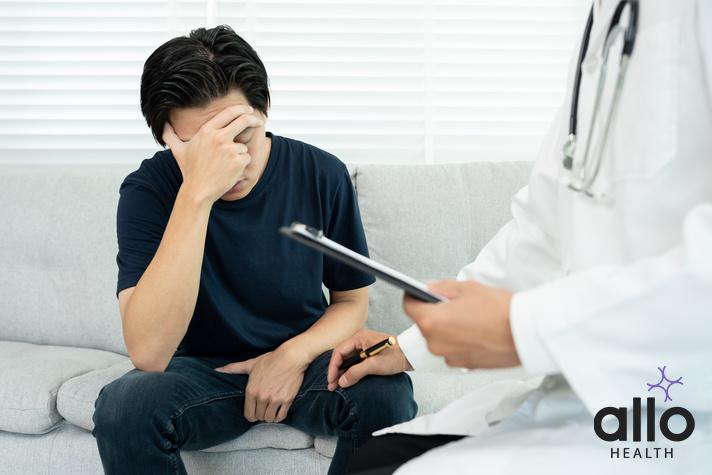Can Lexapro Help With Premature Ejaculation?

Allo Health is dedicated to personalized well-being, offering support and trusted information tailored to individual health goals. The platform emphasizes human-generated content, led by a distinguished medical team of experts, including physicians and sexual health specialists. Their commitment to credibility involves rigorous fact-checking, authoritative research, and continuous updates to ensure accurate, up-to-date information. Allo Health's unique approach goes beyond conventional platforms, providing expert-led insights and a continuous commitment to excellence, with user feedback playing a crucial role in shaping the platform's authoritative voice.

Dr. Raj. R holds an undergraduate medical degree from the Philippines, and has a bachelors background in Psychology. His experience working in the field of urology further brought his interest forward in working towards his passion of understanding the science of attraction, intimacy, sex and relationships. A key motto he practices by remains unprejudiced and non-judgemental care.
Why This Was Upated?
Our experts continually monitor the health and wellness space, and we update our articles when new information became available.
Updated on 04 February, 2024
- Article was updated as part of our commitment to diversity, equity, and inclusion.

"The following blog article provides information about a drug or brand name drug and its potential effects or benefits. However, it is crucial to understand that this information is intended for general educational purposes only and should not be considered a substitute for professional medical consultation. It is highly recommended to consult with a qualified healthcare professional before making any decisions regarding medication, treatment, or healthcare management.
Book consultation
Individuals have unique medical conditions, and the information provided in this article may not be applicable to everyone. Only a qualified healthcare provider can evaluate your specific medical situation, taking into account your medical history, conducting appropriate tests, and providing personalized advice and recommendations. They are equipped to make informed decisions tailored to your individual needs.
It is crucial to emphasize that self-diagnosis, self-medication, or disregarding medical advice can have serious health consequences. This article may reference specific brand names or drugs for illustrative purposes. Mention of these names does not imply endorsement, recommendation, or guarantee of their efficacy or safety. The choice of medication should be based on discussions and individualized guidance from a healthcare professional who has a comprehensive understanding of your medical condition.
"Premature ejaculation is a common sexual dysfunction that affects men. It is defined as the inability to control ejaculation during sexual intercourse, leading to a shorter duration of intercourse and dissatisfied sexual partners. While there are various treatments available for this condition, one medication that has gained attention recently is Lexapro, a serotonin reuptake inhibitor (SSRI) that is commonly used to treat depression and anxiety. In this article, we will explore whether Lexapro can be an effective treatment for premature ejaculation.
What Is Lexapro?
Lexapro is the brand name for a medication called escitalopram oxalate. It is an antidepressant classified as a selective serotonin reuptake inhibitor (SSRI). Escitalopram is used primarily to treat major depressive disorder and generalized anxiety disorder in adults and adolescents who are at least 12 years old.
Here are some key points about Lexapro:
- Mechanism of Action: Lexapro works by increasing the levels of serotonin, a neurotransmitter, in the brain. Serotonin is believed to be involved in mood regulation, and an imbalance of serotonin levels is associated with conditions like depression and anxiety.
- Indications: Lexapro is primarily prescribed for the treatment of major depressive disorder and generalized anxiety disorder. It may also be used for other conditions, such as panic disorder and social anxiety disorder.
- Dosage. The dosage of Lexapro varies depending on the individual’s age, medical condition, and response to treatment. It is typically taken once daily, with or without food.
- Withdrawal: Abruptly stopping Lexapro can lead to withdrawal symptoms. It is important to follow the healthcare provider’s instructions for tapering off the medication if discontinuation is necessary.
- Effectiveness: Lexapro is generally considered effective in the treatment of depression and anxiety disorders. However, individual responses to medications vary, and it may take several weeks for the full therapeutic effect to be realized.
It is crucial for individuals considering or prescribed Lexapro to discuss their medical history, current medications, and any concerns with their healthcare provider. Only a qualified healthcare professional can determine if Lexapro is the right treatment option for a particular individual based on their specific circumstances.
Lexapro Uses & Benefits
Lexapro (escitalopram) is a medication primarily used to treat major depressive disorder (MDD) and generalized anxiety disorder (GAD). Here are detailed explanations of its uses and benefits:
Major Depressive Disorder (MDD):
- Lexapro is FDA-approved for the treatment of major depressive disorder, a condition characterized by persistent low mood, loss of interest or pleasure in activities, changes in appetite or weight, disturbances in sleep, fatigue, feelings of worthlessness or guilt, difficulty concentrating, and suicidal thoughts.
- The medication helps alleviate symptoms of depression by increasing the levels of serotonin in the brain, which is believed to play a role in mood regulation.
Generalized Anxiety Disorder (GAD):
- Lexapro is also approved for the treatment of generalized anxiety disorder. GAD is marked by excessive worry and anxiety that is difficult to control, often involving various aspects of daily life. Physical symptoms such as restlessness, fatigue, muscle tension, and sleep disturbances may also be present.
- By increasing serotonin levels, Lexapro can help reduce the symptoms of anxiety associated with GAD.
Panic Disorder:
- While not initially FDA-approved for panic disorder, Lexapro is sometimes prescribed off-label for this condition. Panic disorder involves recurrent and unexpected panic attacks, often accompanied by intense fear and physical symptoms such as a rapid heart rate, sweating, trembling, and a feeling of impending doom.
Social Anxiety Disorder (Social Phobia):
- Lexapro may also be used off-label to treat social anxiety disorder, which is characterized by an intense fear of social situations and a persistent concern about being embarrassed or humiliated in public.
Obsessive-Compulsive Disorder (OCD):
- In some cases, Lexapro may be prescribed off-label for the treatment of obsessive-compulsive disorder, a condition characterized by intrusive thoughts (obsessions) and repetitive behaviors or mental acts (compulsions).
Benefits of Lexapro:
- Effective in Reducing Symptoms: Lexapro has demonstrated efficacy in alleviating symptoms of depression and anxiety. It works by inhibiting the reuptake of serotonin, leading to increased serotonin levels in the brain, which is associated with improved mood and reduced anxiety.
- Well-Tolerated: Lexapro is generally well-tolerated, and its side effect profile is considered favorable compared to some other antidepressants. Common side effects are usually mild and temporary.
- Once-Daily Dosage: Lexapro is typically taken once daily, which enhances convenience and compliance with the treatment regimen.
- Gradual Onset of Action: Improvement in symptoms may take a few weeks, but patients often experience a gradual reduction in depressive and anxious feelings over time.
- Flexible Dosage: Healthcare providers can adjust the dosage based on an individual’s response and tolerability.
It’s important to note that individual responses to medication vary, and Lexapro may not be suitable for everyone. A healthcare professional should carefully assess each patient’s medical history, symptoms, and potential risks before prescribing Lexapro or any other medication. Additionally, patients should be monitored regularly during treatment to ensure effectiveness and manage any side effects.

Lexapro Side Effects & Precautions
Lexapro (escitalopram) is generally well-tolerated, but like any medication, it may cause side effects. It’s important to be aware of potential side effects and take necessary precautions when using Lexapro. Here is a detailed overview of side effects and precautions:
Common Side Effects:
- Nausea: Feeling of sickness or discomfort in the stomach.
- Insomnia: Difficulty falling asleep or staying asleep.
- Drowsiness: Feeling sleepy or fatigued.
- Dry Mouth: Reduced saliva production leading to a dry sensation in the mouth.
- Increased Sweating: Experiencing more sweating than usual.
- Changes in Weight: Some people may experience changes in weight, either weight loss or weight gain.
Less Common Side Effects:
- Headache: Pain or discomfort in the head.
- Dizziness: Feeling lightheaded or unsteady.
- Sexual Side Effects: Such as decreased libido, difficulty achieving or maintaining an erection (in men), or difficulty reaching orgasm.
Serious Side Effects (Rare, but Important to Monitor):
- Serotonin Syndrome: Symptoms include agitation, hallucinations, rapid heartbeat, fever, muscle stiffness, and loss of coordination. Seek medical attention if these symptoms occur.
- Allergic Reaction: Signs may include rash, itching/swelling (especially of the face/tongue/throat), severe dizziness, or difficulty breathing.
Precautions:
- Suicidal Thoughts: Antidepressants, including Lexapro, may increase the risk of suicidal thoughts, especially in young adults and teenagers. Close monitoring is crucial, and any unusual changes in behavior should be reported to a healthcare professional.
- Pregnancy and Breastfeeding: Consult with a healthcare provider before using Lexapro during pregnancy or breastfeeding. The benefits and risks should be carefully evaluated, and the healthcare provider may adjust the treatment plan accordingly.
- Medical History: Inform your healthcare provider of your complete medical history, including any history of liver or kidney problems, seizures, bipolar disorder, or a personal or family history of suicide attempts.
- Drug Interactions: Lexapro may interact with other medications, including other antidepressants, certain pain medications, and medications that affect bleeding. Provide a list of all medications, including over-the-counter drugs and supplements, to your healthcare provider.
- Withdrawal Symptoms: Abruptly stopping Lexapro can lead to withdrawal symptoms such as dizziness, nausea, headache, irritability, and sleep disturbances. Tapering off the medication under the guidance of a healthcare professional is important.
- Monitoring: Regularly attend follow-up appointments with your healthcare provider to monitor your response to Lexapro, assess for side effects, and adjust the treatment plan as needed.
It’s crucial to communicate openly with your healthcare provider about any concerns or side effects you may be experiencing while taking Lexapro. They can provide guidance on managing side effects and make adjustments to your treatment plan if necessary. If you experience severe or persistent side effects, seek medical attention promptly.
Lexapro Drug Interactions
Lexapro (escitalopram) can interact with other medications, potentially affecting their effectiveness or increasing the risk of side effects. It’s important to inform your healthcare provider about all the medications, including prescription drugs, over-the-counter medications, and supplements, that you are currently taking. Below is a detailed overview of some of the potential drug interactions with Lexapro:
- Monoamine Oxidase Inhibitors (MAOIs):
- Combining Lexapro with MAOIs, a class of antidepressants, can lead to a potentially life-threatening condition known as serotonin syndrome. MAOIs include medications like phenelzine, tranylcypromine, and isocarboxazid.
- There should be a sufficient time gap (usually at least 14 days) between stopping MAOIs and starting Lexapro.
- Other SSRIs and SNRIs:
- Concurrent use of Lexapro with other selective serotonin reuptake inhibitors (SSRIs) or serotonin-norepinephrine reuptake inhibitors (SNRIs) can increase the risk of serotonin syndrome.
- Combining multiple drugs that affect serotonin levels should be done cautiously and under the supervision of a healthcare provider.
- Triptans (Migraine Medications): Combining Lexapro with triptans, which are medications used for the treatment of migraines, may increase the risk of serotonin syndrome and other adverse effects.
- Tricyclic Antidepressants (TCAs): Concurrent use of Lexapro with tricyclic antidepressants may increase the risk of side effects, including serotonin syndrome and an increased risk of QT prolongation (an abnormal heart rhythm).
- Warfarin and Other Anticoagulants: Escitalopram may interact with anticoagulant medications like warfarin, potentially increasing the risk of bleeding. Regular monitoring of coagulation parameters is advisable when combining these medications.
- Non-Steroidal Anti-Inflammatory Drugs (NSAIDs): NSAIDs, such as ibuprofen or aspirin, may increase the risk of bleeding when taken with Lexapro.
- Antiplatelet Drugs: Combining Lexapro with antiplatelet drugs, like clopidogrel, may increase the risk of bleeding.
- Lithium: The combination of Lexapro and lithium, a medication used to treat bipolar disorder, may increase the risk of serotonin syndrome and other side effects.
- Cimetidine: Cimetidine, a medication used to treat stomach ulcers, may increase the levels of Lexapro in the blood, potentially leading to an increased risk of side effects.
- St. John’s Wort: St. John’s Wort, an herbal supplement used for depression, can interact with Lexapro and other SSRIs, leading to serotonin syndrome and reducing the effectiveness of the medication.

Always consult with your healthcare provider before starting, stopping, or changing the dosage of any medication. Inform them of your complete medication history, including any over-the-counter products and supplements, to ensure safe and effective treatment. If you experience any unusual symptoms or side effects while taking Lexapro, seek medical attention promptly.
Can Lexapro Help With Premature Ejaculation?
Lexapro (escitalopram) is primarily known as an antidepressant and is classified as a selective serotonin reuptake inhibitor (SSRI). While it is not specifically approved for the treatment of premature ejaculation (PE), some studies have explored the use of SSRIs, including escitalopram, as a potential treatment for this condition.
How SSRIs May Help with Premature Ejaculation:
- Serotonin’s Role: Serotonin is a neurotransmitter that plays a role in mood regulation and has an inhibitory effect on ejaculation. SSRIs, by increasing serotonin levels in the brain, can delay ejaculation.
- Delayed Ejaculation: One common side effect of SSRIs is delayed ejaculation. This side effect has led researchers to investigate the use of SSRIs, including Lexapro, as off-label treatments for premature ejaculation.
Research on Lexapro for Premature Ejaculation:
Several studies have investigated the use of SSRIs, including Lexapro, for treating premature ejaculation. Some findings suggest that SSRIs can increase the time to ejaculation and improve control over ejaculation.
It’s important to note that while some individuals may experience benefits, the use of SSRIs for premature ejaculation is considered off-label, meaning it is not an officially approved use of the medication.
Considerations:
- Individual Response: Responses to medication can vary among individuals, and what works for one person may not work for another.
- Consultation with a Healthcare Provider: If you are experiencing premature ejaculation and are considering the use of Lexapro or any other medication, it is crucial to consult with a healthcare provider. They can assess your specific situation, discuss potential risks and benefits, and determine an appropriate course of action.
- Dosing Considerations: The dosage of Lexapro used for premature ejaculation may differ from the standard antidepressant dosage. Your healthcare provider will determine the appropriate dose based on your individual needs.
- Other Treatment Options: In addition to medication, other treatment options for premature ejaculation include behavioral techniques, topical anesthetics, and counseling.
Potential Side Effects:
It’s important to be aware of potential side effects associated with the use of Lexapro, including those related to sexual function. These may include changes in libido, difficulty achieving or maintaining an erection, and delayed ejaculation.
In summary, while there is some evidence supporting the use of SSRIs, including Lexapro, for premature ejaculation, it’s essential to approach this with the guidance of a healthcare professional. They can help assess your specific situation, discuss treatment options, and monitor for any potential side effects.
Most Asked Questions
-
Can Lexapro be used to treat premature ejaculation?
Lexapro, an antidepressant labeled as a selective serotonin reuptake inhibitor (SSRI), has been studied as an off-label treatment for premature ejaculation (PE). Some studies shows that SSRIs, including Lexapro, might also help delay ejaculation by means of increasing serotonin levels inside the brain. However, it is crucial to consult with a healthcare company to decide the appropriateness of this remedy for man or woman instances.
-
How does Lexapro paintings for premature ejaculation?
Lexapro's mechanism of movement entails growing serotonin stages, a neurotransmitter related to temper law. In the context of premature ejaculation, better serotonin tiers may additionally postpone ejaculation. While the precise mechanism is not completely understood, the inhibitory impact of serotonin on ejaculation is thought to make a contribution to the capability effectiveness of SSRIs in dealing with PE.
-
What is the recommended dosage of Lexapro for premature ejaculation?
The dosage of Lexapro for untimely ejaculation may also differ from popular antidepressant dosages. Healthcare carriers will determine the proper dose based totally on individual factors, considering the balance among capacity advantages and side consequences. It's critical to observe the prescribed dosage and visit a healthcare professional often to reveal development.
-
Are there capability aspect consequences of the usage of Lexapro for premature ejaculation?
Yes, the usage of Lexapro for untimely ejaculation may be related to side consequences. These can encompass changes in libido, issue reaching or keeping an erection, and not on time ejaculation. It's critical for individuals thinking about this treatment to be aware about capability side consequences and to talk brazenly with their healthcare company about any issues.
-
Can Lexapro be the only treatment for untimely ejaculation?
Lexapro may be used as part of a complete treatment plan for premature ejaculation, but it's no longer always the only solution. Behavioral strategies, counseling, and topical anesthetics are among other remedy options. A healthcare provider will assess man or woman wishes and can suggest a mixture of procedures to deal with premature ejaculation correctly.






































